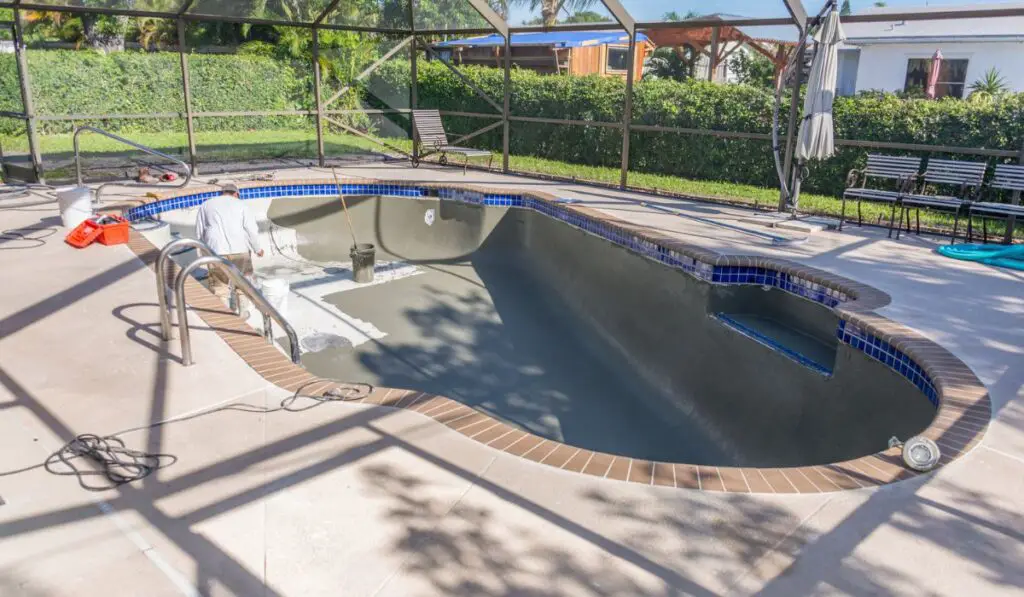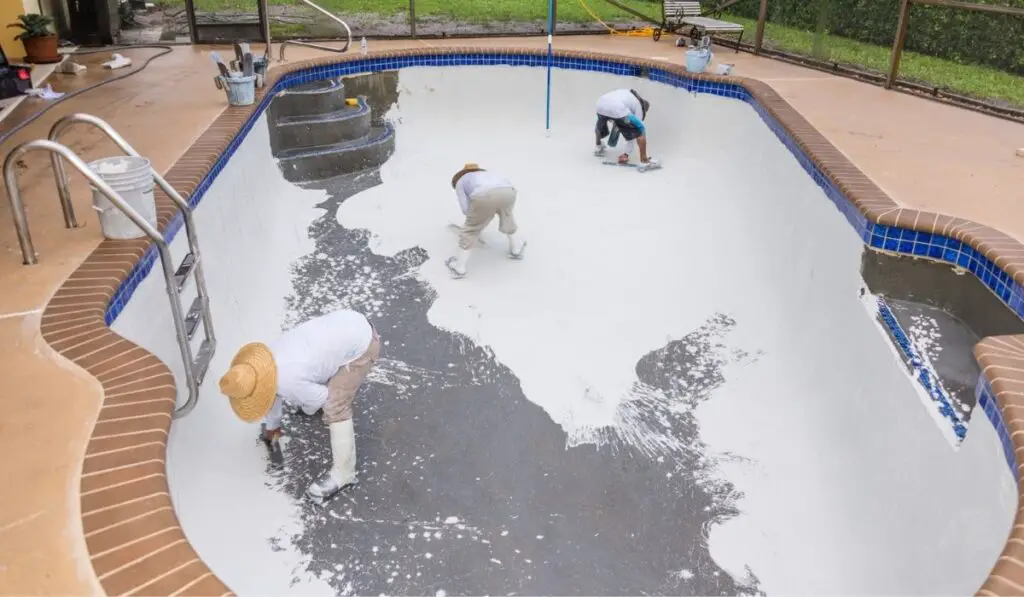Your swimming pool should be nothing less than a summer haven. It’s where you relax in the sun, gather with friends and family for parties, cool off and unwind on hot days, and practice your backstroke. But what are you supposed to do if your gunite swimming pool starts developing cracks?
If you notice stains and leaks or feel that your pool surface is rougher than normal, you may need to repair your gunite pool. You can easily fix small cracks and re-apply grout yourself, but for leaks and larger, more damaging cracks, it’s best to hire a professional for assistance.
While maintaining your swimming pool is a necessary (and frustrating) chore, the benefits of proper maintenance more than makeup for it. Let’s look at when you should repair your pool, how you can repair it yourself, when you should call a professional, and how much it will ultimately cost.
When Is It Time to Repair a Gunite Pool?

There are several signs that help indicate when it’s time to repair your gunite pool. Some of these include:
Stains
A stain can be of any shape, size, and color. Generally, stains on the surface of your pool are more of an annoying problem than a serious one. But just like a stain on your favorite jacket can be pretty frustrating, a pool stain can also become irritating if it catches your eye whenever you’re near the pool.
Most stains on your pool surface are caused by:
- Algae
- Mineral and chemical inputs
- Leaves, twigs, and other natural debris
If the stains in your pool are growing in quantity or size, or if you’re unable to clean them up, then it may be time to repair your pool.
Texture
If your pool surface feels more rough than it should, or if you notice cracks in the gunite, that’s a glaring red flag. The surface of your pool is deteriorating and will only continue to get worse.
Along with stains, imbalanced water pH levels can also deteriorate your pool’s surface. If you’re having to use pool cleaning chemicals more than usual, then the pool water may be unbalanced and you might need to repair your pool.
Leaks
A damaged or worn-out pool doesn’t hold water very well. If you find yourself adding water to your pool every other day, then you might have a leak.
As is the case with a deteriorating pool surface, leaks will also get worse if you don’t repair them immediately. Putting repairs off will increase your water bill as well until you’ll have to completely resurface your pool.
What You Can Do Yourself vs. When to Call a Professional
Over time, your pool can lose grout and develop cracks and leaks. Your pool surface can chip and form hollow spots or “pop-ups” as well. However, you can easily repair these minor issues yourself with just a few tools and a bit of knowledge.
Cracks
Cracks in your gunite pool aren’t always a cause for alarm, as shifting ground usually forms hairline fractures. If your pool has small cracks, you can easily fix the issue with a mask, a screwdriver, and a pair of goggles.
You’ll need to use the screwdriver to open up the crack a bit and remove any debris stuck inside before using pool putty (on Amazon) to cover it back up.
Keep in mind that bigger, more threatening cracks are more difficult and time-consuming to fix. The process requires draining the entire pool, using a powerful grinder, and plenty of elbow grease. If you notice large cracks in your pool, then it’s better to hire a professional to fix the problem.
However, if you have previous experience and know how to properly use a drill, here’s what you need to do:
- Clean: Make sure your gunite pool is completely dry, then use a broom to clean up any loose dirt or debris surrounding the cracked surface.
- Use a grinder: Use a powerful grinder, preferably one with a diamond blade, to open up and widen the crack. It’s advisable to set the grinder on the lowest setting and then place it inside the crack for this step.
Carefully move the grinder around the crack until it’s a few inches wide and deep. Clean up the gunite dust with a rag, and then use a hose to wet the area. This will ensure that the gunite doesn’t extract moisture from the cement.
- Mix cement: Mix two parts white sand and three parts cement in a bucket. You can also use an acrylic cement bonding agent in the mixture. You can easily purchase it from a pool supply or home improvement store.
Slowly mix in one part water until the cement mixture is pasty and has a consistency similar to that of peanut butter.
- Caulk: Use a putty knife to apply the mixture to the crack. You can also spread a bead of caulk along the crack and leave enough space for the cement to cover the caulk. It’s advisable to leave around ¼ inch of space and then let the caulk dry.
Next, completely fill the crack with the sand, water, and cement mixture. Remove any excess and smooth the top with a trowel.
- Plaster: Once the cement mixture is completely dry, apply a coat of plaster over the surface.
Grout
Tiled swimming pools usually lose grout over the years, but you can easily fix the problem yourself. Once you’ve identified the tiles that require re-grouting, use a chisel or grout scraper (on Amazon) to remove the grout left between them.
Mix equal parts water and white vinegar, and then use the mixture to clean the scraped-out area between the tiles. Next, use a vacuum to clean up any dirt or debris.
Choose a waterproof epoxy grout that matches the existing one, mix it, and apply it to the spaces between the tiles. Once it’s completely dry, just use a swimming pool sealant to seal the grout, and your tiles will look as good as new!
Leaks
There’s no need to panic if you think your pool isn’t holding water. Search around your pool for any leaks and check the filter system for any damages.
It’s important to note that leaks can be caused by a faulty filter, chlorinator, pump, heater, or any other component of your pool system. Leaks in a gunite pool are difficult to fix, and it’s better to hire a professional for repairs.
Cost Breakdown of Repairing a Gunite Pool

The total amount you’ll need to spend on gunite pool repairs ultimately depends on your pool problem. Minor pool repairs usually cost as little as $200, but the price increases with the complexity of the problem.
Almost all gunite pools develop cracks over time. These cracks could be surface or structural cracks. Most pool contractors charge around $75 per linear foot to fix minor cracks.
On the other hand, fixing large, structural pool cracks on a 150-square foot gunite pool can cost as much as $1,000.
How Long Does It Take to Repair a Gunite Pool?
The answer to this question also depends on the type of pool problem. However, keep in mind that even if you put off a minor issue, it will become deeper, bigger, and more destructive over time.
You can easily re-apply grout and fix minor cracks in just a couple of hours. However, completely replacing your pool’s surface will take around one to two working days. Your pool will also undergo a curing process after resurfacing, so you’ll have to wait an additional two weeks before you can use your pool.
